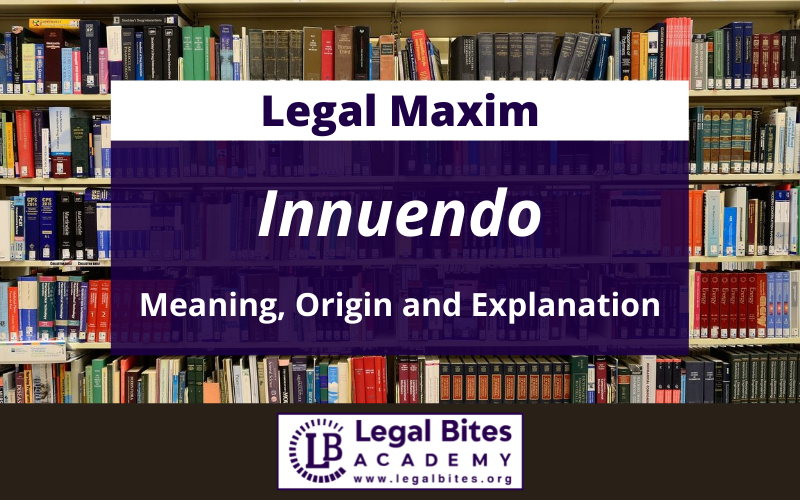Innuendo: Origin, Meaning and Explanation
This article titled ‘Innuendo: Origin, Meaning and Explanation’ is written by Sahajpreet Bhusari and discusses the concept of Innuendo. I. Origin and Meaning Innuendo is a legal term of Latin origin. It is derived from the phrase innuere which means ‘to make a sign’.[1] II. Explanation and Application Innuendo is a defamatory statement made by the respondent, which may… Read More »

This article titled ‘Innuendo: Origin, Meaning and Explanation’ is written by Sahajpreet Bhusari and discusses the concept of Innuendo. I. Origin and Meaning Innuendo is a legal term of Latin origin. It is derived from the phrase innuere which means ‘to make a sign’.[1] II. Explanation and Application Innuendo is a defamatory statement made by the respondent, which may not be defamatory but innocent, but carries a secondary meaning sufficient to make it a defamatory...
This article titled ‘Innuendo: Origin, Meaning and Explanation’ is written by Sahajpreet Bhusari and discusses the concept of Innuendo.
I. Origin and Meaning
Innuendo is a legal term of Latin origin. It is derived from the phrase innuere which means ‘to make a sign’.[1]
II. Explanation and Application
Innuendo is a defamatory statement made by the respondent, which may not be defamatory but innocent, but carries a secondary meaning sufficient to make it a defamatory and offensive statement.
There are two types of implication:
- False Innuendo: Another meaning that the average person can read between lines or deduce from
- True Innuendo: This is where words that may seem innocent to some people may seem defamatory to others because they have special knowledge or additional information, such as a supposed to be married, this would not be defamatory to most readers, but it would be to readers who knew the person was married and as such would be guilty of bigotry.
III. Case Laws
The aspect of innuendo is most clearly highlighted in the case of Lewis v. Daily Telegraph Ltd[2]. In this case, two newspapers published claims that City of London Fraud Squad agents were investigating the incident of R.Co. and its subsidiaries and the president of R.Co. was Lewis who sued every newspaper for libel.
Two sets of actions are evaluated separately. L argued that the statement meant he committed fraud or was suspected by police of having committed fraud or dishonesty in connection with R.Co. R.Co. begged for innuendo. The plaintiffs did not allege specific damages. The defendants admitted the claims were libel in their usual sense but argued that the Fraud Team was investigating at the time the R.Co cases were announced.
In W. Hay and Ors. v. Aswini Kumar Samanta[3], a division of the High Court of Calcutta, ruled that there were clear grounds in an action for libel. Common defamatory words should be included in the complaint. When comments are inherently or defamatory, only the words should be said.
Wherever defamation does not appear on the face of the word, the meaning of defamation, or as it is technically known in law, the innuendo must also be stated and presented in terms of clear and precise language. Again, the accused words will be defamatory only in the specific context in which they are used, spoken or published.
References
[1] Innuendo, Available Here
[2] (1964) AC 234.
[3] AIR 1958 Cal 269.


